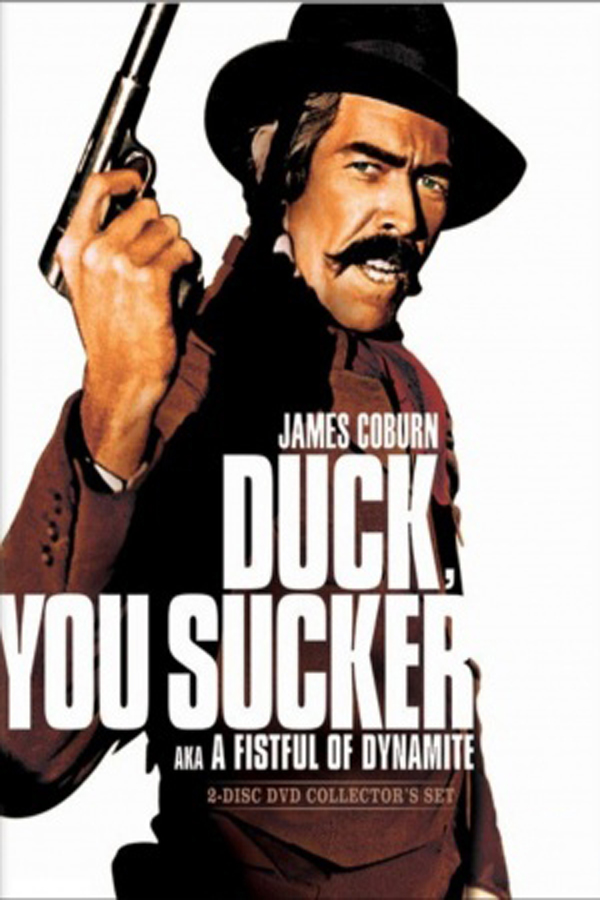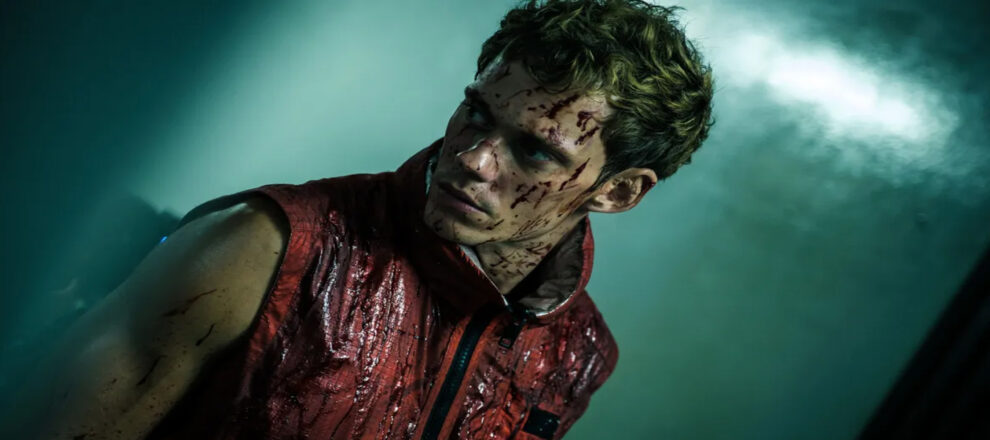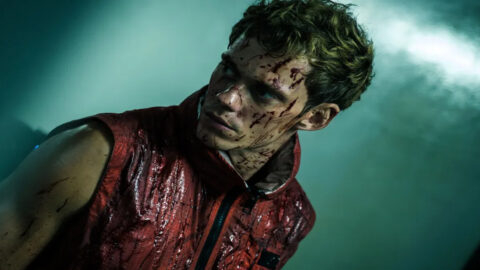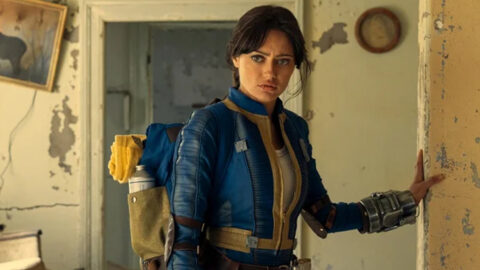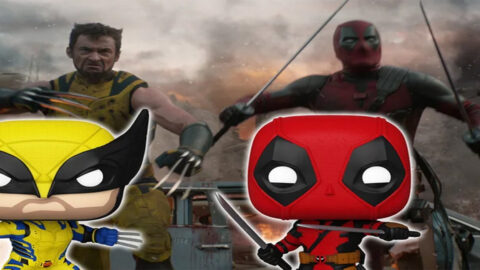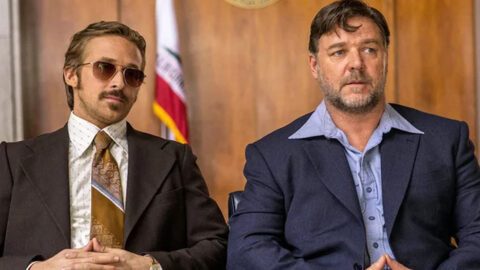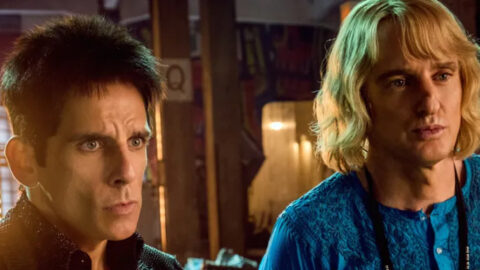By David Ehrlich
Published 1 hour ago
Good news for 12-year-old kids who talk about Deadpool as if he’s Jean-Luc Godard, think calling someone a “fuck puppet” is the height of comedy, and just can’t wait until July for another noxiously self-aware cartoon bloodbath about a disfigured anti-hero who dresses in red and simply refuses to shut up: “Boy Kills World” is here, and while it may be a touch less meta than the Merc with a Mouth’s forthcoming installment of the MCU, it does co-star Brett Gelman as a loathsome shitheel whose frustrated creative ambitions have compelled him to endorse child murder, so that’s something.
Another point in its favor: The film’s hyper-logorrheic protagonist doesn’t actually talk, on account of the fact that his tongue was sliced off when he was a child. “Boy” communicates to us instead through the magic of his internal monologue, for which he permanently assigned the voice of H. Jon Benjamin because the “Bob’s Burgers” actor sounds like a little boy’s idea of a lovable vigilante, equal parts Ryan Reynolds and Christian Bale.
As with most of the details that make up Moritz Mohr’s all too zany debut, it’s a clever device that would’ve been funny if it had been funny. But in spite of its demented enthusiasm (as well as this independently financed, Sam Raimi-produced film’s welcome rejection of anything that might resemble a studio note), Mohr’s frenetic and exhausting video game of a movie doesn’t know where to focus its energy. Which brings us to some other reasons why “Boy Kills World” feels like such a fitting appetizer for “Deadpool & Wolverine”: Its self-awareness blinds the script from seeing its own weaknesses, while its non-stop quippery is used to disguise a story that doesn’t have a single coherent thing to say — a benign feature that swiftly turns into a fatal bug after a third act plot twist reveals the narrative’s full ambition.
Good news for 12-year-old kids who talk about Deadpool as if he’s Jean-Luc Godard, think calling someone a “fuck puppet” is the height of comedy, and just can’t wait until July for another noxiously self-aware cartoon bloodbath about a disfigured anti-hero who dresses in red and simply refuses to shut up: “Boy Kills World” is here, and while it may be a touch less meta than the Merc with a Mouth’s forthcoming installment of the MCU, it does co-star Brett Gelman as a loathsome shitheel whose frustrated creative ambitions have compelled him to endorse child murder, so that’s something.
Another point in its favor: The film’s hyper-logorrheic protagonist doesn’t actually talk, on account of the fact that his tongue was sliced off when he was a child. “Boy” communicates to us instead through the magic of his internal monologue, for which he permanently assigned the voice of H. Jon Benjamin because the “Bob’s Burgers” actor sounds like a little boy’s idea of a lovable vigilante, equal parts Ryan Reynolds and Christian Bale.
As with most of the details that make up Moritz Mohr’s all too zany debut, it’s a clever device that would’ve been funny if it had been funny. But in spite of its demented enthusiasm (as well as this independently financed, Sam Raimi-produced film’s welcome rejection of anything that might resemble a studio note), Mohr’s frenetic and exhausting video game of a movie doesn’t know where to focus its energy. Which brings us to some other reasons why “Boy Kills World” feels like such a fitting appetizer for “Deadpool & Wolverine”: Its self-awareness blinds the script from seeing its own weaknesses, while its non-stop quippery is used to disguise a story that doesn’t have a single coherent thing to say — a benign feature that swiftly turns into a fatal bug after a third act plot twist reveals the narrative’s full ambition.
But it’s what “Boy Kills World” doesn’t share in common with its closest Hollywood relatives that can make it feel like a breath of fresh air, specifically — and ironically — its naive sense of anarchy. Mohr and his screenwriters Arend Remmers and Tyler Burton Smith may have seen every major action movie of the last 20 years, but Boy wouldn’t understand any of their references. Born into a comic book country ruled by a tyrannical despot named Hilda van der Koy (Famke Janssen), who keeps her grip on the population with the help of an annual “Culling” in which dissenters are forced to fight to the death on live TV, Boy didn’t exactly spend a lot of time at the multiplex when he was growing up.
He and his kid sister Mina (Quinn Copeland) used to hang out at the local arcade, which explains his penchant for thinking in video game terms, but that was before Hilda personally shot Mina and his mother in the head. The execution left Boy deaf, mute, and desperate for any reason to keep living. That’s exactly what he got from the shaman in the forest (“The Raid” star Yayan Ruhian), who trained Boy to become the ultimate weapon of revenge, indifferent to the fact that his trauma-induced psychosis was growing at the same rate as his combat skills.
And his abs. Transforming from a fresh-faced kid into a ridiculously shredded adult, and from young actors Cameron and Nicholas Crovetti into Bill Skarsgård (the younger brother of the actor whose sons they played on “Big Little Lies”), Boy emerges from his decades of training as a “Tekken”-worthy fighter who parkours like a squirrel and uses his legs like a pencak silat master despite maintaining the mind of a child on bath salts. He imagines the shaman’s eyeballs floating out of his head like bubbles, and sees the upbeat ghost of his dead sister as if she were playing alongside him. “I am the tidiest assassin, super clean and super deadly!” Benjamin’s voice brags to us at one point, epitomizing how much sillier and more in its element this movie can be when its heightened personality takes the reins from its edgy-cute puerility.
That’s true enough of the film’s delirious fight sequences as well, which are at their best when they privilege unexpected silliness over moments of self-insistent flippancy. The part where Skarsgård eviscerates one of Hilda’s goons with a cheese grater? Fantastic. The bit where one of his disposable new allies displays his skills at hiding behind a cart while Boy, ecstatic over having a teammate for the first time in his life, kills all the bad guys? Delightful. The extended scene where Boy slaughters the Culling’s official costumed mascots in a TV studio, one of whom is dressed like a giant pineapple? Less so, and made even worse because the film neglects to do much of anything with the observation that “the real world” has become impossible to distinguish from the stuff of Boy’s deranged mind.
Still, Marvel would kill for these kinds of fight scenes, kinetically choreographed by “Kingsman” veteran Dawid Szatarski. His recognizable flair for cartoon ultra-violence suits the story’s tone and takes full advantage of Peter Matjasko’s handheld cinematography, which sticks to the combat with the closeness of a referee and mines visceral personality from the usual mix of stabbings and dismemberments. It helps that Skarsgård is an immediately credible action star, and that he never seems to forget his character’s brain-washed giddiness even when he’s killing five people at once. An early nod to “City Lights” anchors Boy to a Chaplinesque innocence that informs the blocking, and it feels like he’s having the time of his life right up to the moment when the movie pulls the rug out from under him, effectively rearranging Boy’s entire moral universe with a reveal that it has zero desire to unpack.
Good news for 12-year-old kids who talk about Deadpool as if he’s Jean-Luc Godard, think calling someone a “fuck puppet” is the height of comedy, and just can’t wait until July for another noxiously self-aware cartoon bloodbath about a disfigured anti-hero who dresses in red and simply refuses to shut up: “Boy Kills World” is here, and while it may be a touch less meta than the Merc with a Mouth’s forthcoming installment of the MCU, it does co-star Brett Gelman as a loathsome shitheel whose frustrated creative ambitions have compelled him to endorse child murder, so that’s something.
Another point in its favor: The film’s hyper-logorrheic protagonist doesn’t actually talk, on account of the fact that his tongue was sliced off when he was a child. “Boy” communicates to us instead through the magic of his internal monologue, for which he permanently assigned the voice of H. Jon Benjamin because the “Bob’s Burgers” actor sounds like a little boy’s idea of a lovable vigilante, equal parts Ryan Reynolds and Christian Bale.
As with most of the details that make up Moritz Mohr’s all too zany debut, it’s a clever device that would’ve been funny if it had been funny. But in spite of its demented enthusiasm (as well as this independently financed, Sam Raimi-produced film’s welcome rejection of anything that might resemble a studio note), Mohr’s frenetic and exhausting video game of a movie doesn’t know where to focus its energy. Which brings us to some other reasons why “Boy Kills World” feels like such a fitting appetizer for “Deadpool & Wolverine”: Its self-awareness blinds the script from seeing its own weaknesses, while its non-stop quippery is used to disguise a story that doesn’t have a single coherent thing to say — a benign feature that swiftly turns into a fatal bug after a third act plot twist reveals the narrative’s full ambition.
But it’s what “Boy Kills World” doesn’t share in common with its closest Hollywood relatives that can make it feel like a breath of fresh air, specifically — and ironically — its naive sense of anarchy. Mohr and his screenwriters Arend Remmers and Tyler Burton Smith may have seen every major action movie of the last 20 years, but Boy wouldn’t understand any of their references. Born into a comic book country ruled by a tyrannical despot named Hilda van der Koy (Famke Janssen), who keeps her grip on the population with the help of an annual “Culling” in which dissenters are forced to fight to the death on live TV, Boy didn’t exactly spend a lot of time at the multiplex when he was growing up.
He and his kid sister Mina (Quinn Copeland) used to hang out at the local arcade, which explains his penchant for thinking in video game terms, but that was before Hilda personally shot Mina and his mother in the head. The execution left Boy deaf, mute, and desperate for any reason to keep living. That’s exactly what he got from the shaman in the forest (“The Raid” star Yayan Ruhian), who trained Boy to become the ultimate weapon of revenge, indifferent to the fact that his trauma-induced psychosis was growing at the same rate as his combat skills.
And his abs. Transforming from a fresh-faced kid into a ridiculously shredded adult, and from young actors Cameron and Nicholas Crovetti into Bill Skarsgård (the younger brother of the actor whose sons they played on “Big Little Lies”), Boy emerges from his decades of training as a “Tekken”-worthy fighter who parkours like a squirrel and uses his legs like a pencak silat master despite maintaining the mind of a child on bath salts. He imagines the shaman’s eyeballs floating out of his head like bubbles, and sees the upbeat ghost of his dead sister as if she were playing alongside him. “I am the tidiest assassin, super clean and super deadly!” Benjamin’s voice brags to us at one point, epitomizing how much sillier and more in its element this movie can be when its heightened personality takes the reins from its edgy-cute puerility.
That’s true enough of the film’s delirious fight sequences as well, which are at their best when they privilege unexpected silliness over moments of self-insistent flippancy. The part where Skarsgård eviscerates one of Hilda’s goons with a cheese grater? Fantastic. The bit where one of his disposable new allies displays his skills at hiding behind a cart while Boy, ecstatic over having a teammate for the first time in his life, kills all the bad guys? Delightful. The extended scene where Boy slaughters the Culling’s official costumed mascots in a TV studio, one of whom is dressed like a giant pineapple? Less so, and made even worse because the film neglects to do much of anything with the observation that “the real world” has become impossible to distinguish from the stuff of Boy’s deranged mind.
Still, Marvel would kill for these kinds of fight scenes, kinetically choreographed by “Kingsman” veteran Dawid Szatarski. His recognizable flair for cartoon ultra-violence suits the story’s tone and takes full advantage of Peter Matjasko’s handheld cinematography, which sticks to the combat with the closeness of a referee and mines visceral personality from the usual mix of stabbings and dismemberments. It helps that Skarsgård is an immediately credible action star, and that he never seems to forget his character’s brain-washed giddiness even when he’s killing five people at once. An early nod to “City Lights” anchors Boy to a Chaplinesque innocence that informs the blocking, and it feels like he’s having the time of his life right up to the moment when the movie pulls the rug out from under him, effectively rearranging Boy’s entire moral universe with a reveal that it has zero desire to unpack.
It’s brutal that “Boy Kills World” decides to get serious at the precise moment when it runs out of momentum, but the movie feels all too compelled to justify the visual extravagances it’s piled up along the way. The sudden pivot from the cool for coolness’ sake logic of a side-scrolling beat-em-up to the dramatic backstory of a “Metal Gear Solid” underscores Mohr’s inability to balance them both at once (not everybody can be Hideo Kojima), and characters like Jessica Rothe’s June27 — a masked swordswoman whose thoughts are expressed through the LED screen on her motorcycle helmet — become considerably less awesome the moment the script calls for them to be anything else as well.
That isn’t a problem for Hilda’s other minions, who are never awesome to begin with; Gelman’s huffy writer is the worst of a mostly forgettable lot, though Sharlto Copley has a good time as a seersucker fascist who feels a bit like Donald Trump until the moment when he actually gets the fate he deserves. It is, however, a problem for anyone watching along in the audience — anyone still holding out hope that “Boy Kills World” will meaningfully explore the male rage that burns in its veins (and that its villains seek to harness for their own agendas), or rescue some measure of intentionality from a plot that doesn’t seem to recognize the comfort it finds in corporate authoritarianism. Somehow, I suspect that “Deadpool & Wolverine” won’t have the same problem.
